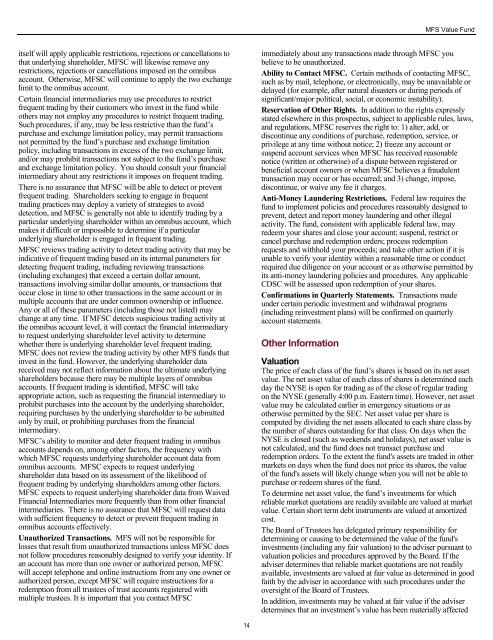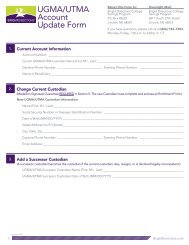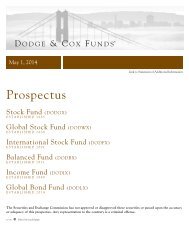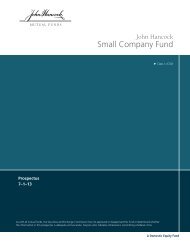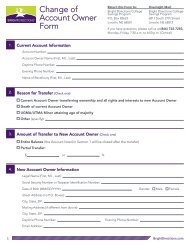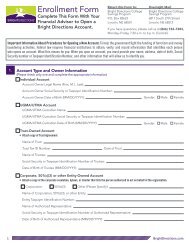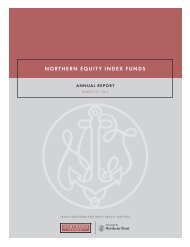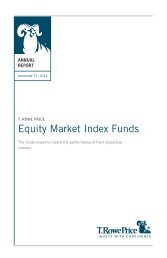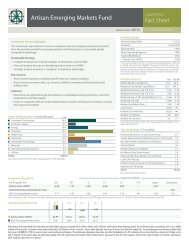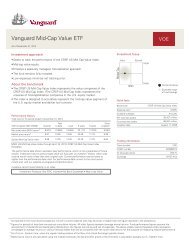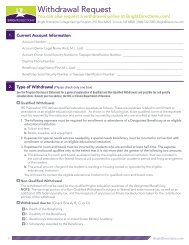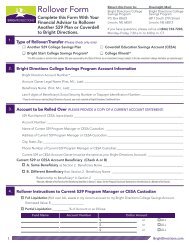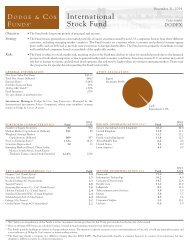EIF Prospectus - Bright Directions
EIF Prospectus - Bright Directions
EIF Prospectus - Bright Directions
You also want an ePaper? Increase the reach of your titles
YUMPU automatically turns print PDFs into web optimized ePapers that Google loves.
MFS Value Fund<br />
itself will apply applicable restrictions, rejections or cancellations to<br />
that underlying shareholder, MFSC will likewise remove any<br />
restrictions, rejections or cancellations imposed on the omnibus<br />
account. Otherwise, MFSC will continue to apply the two exchange<br />
limit to the omnibus account.<br />
Certain financial intermediaries may use procedures to restrict<br />
frequent trading by their customers who invest in the fund while<br />
others may not employ any procedures to restrict frequent trading.<br />
Such procedures, if any, may be less restrictive than the fund‟s<br />
purchase and exchange limitation policy, may permit transactions<br />
not permitted by the fund‟s purchase and exchange limitation<br />
policy, including transactions in excess of the two exchange limit,<br />
and/or may prohibit transactions not subject to the fund‟s purchase<br />
and exchange limitation policy. You should consult your financial<br />
intermediary about any restrictions it imposes on frequent trading.<br />
There is no assurance that MFSC will be able to detect or prevent<br />
frequent trading. Shareholders seeking to engage in frequent<br />
trading practices may deploy a variety of strategies to avoid<br />
detection, and MFSC is generally not able to identify trading by a<br />
particular underlying shareholder within an omnibus account, which<br />
makes it difficult or impossible to determine if a particular<br />
underlying shareholder is engaged in frequent trading.<br />
MFSC reviews trading activity to detect trading activity that may be<br />
indicative of frequent trading based on its internal parameters for<br />
detecting frequent trading, including reviewing transactions<br />
(including exchanges) that exceed a certain dollar amount,<br />
transactions involving similar dollar amounts, or transactions that<br />
occur close in time to other transactions in the same account or in<br />
multiple accounts that are under common ownership or influence.<br />
Any or all of these parameters (including those not listed) may<br />
change at any time. If MFSC detects suspicious trading activity at<br />
the omnibus account level, it will contact the financial intermediary<br />
to request underlying shareholder level activity to determine<br />
whether there is underlying shareholder level frequent trading.<br />
MFSC does not review the trading activity by other MFS funds that<br />
invest in the fund. However, the underlying shareholder data<br />
received may not reflect information about the ultimate underlying<br />
shareholders because there may be multiple layers of omnibus<br />
accounts. If frequent trading is identified, MFSC will take<br />
appropriate action, such as requesting the financial intermediary to<br />
prohibit purchases into the account by the underlying shareholder,<br />
requiring purchases by the underlying shareholder to be submitted<br />
only by mail, or prohibiting purchases from the financial<br />
intermediary.<br />
MFSC‟s ability to monitor and deter frequent trading in omnibus<br />
accounts depends on, among other factors, the frequency with<br />
which MFSC requests underlying shareholder account data from<br />
omnibus accounts. MFSC expects to request underlying<br />
shareholder data based on its assessment of the likelihood of<br />
frequent trading by underlying shareholders among other factors.<br />
MFSC expects to request underlying shareholder data from Waived<br />
Financial Intermediaries more frequently than from other financial<br />
intermediaries. There is no assurance that MFSC will request data<br />
with sufficient frequency to detect or prevent frequent trading in<br />
omnibus accounts effectively.<br />
Unauthorized Transactions. MFS will not be responsible for<br />
losses that result from unauthorized transactions unless MFSC does<br />
not follow procedures reasonably designed to verify your identity. If<br />
an account has more than one owner or authorized person, MFSC<br />
will accept telephone and online instructions from any one owner or<br />
authorized person, except MFSC will require instructions for a<br />
redemption from all trustees of trust accounts registered with<br />
multiple trustees. It is important that you contact MFSC<br />
immediately about any transactions made through MFSC you<br />
believe to be unauthorized.<br />
Ability to Contact MFSC. Certain methods of contacting MFSC,<br />
such as by mail, telephone, or electronically, may be unavailable or<br />
delayed (for example, after natural disasters or during periods of<br />
significant/major political, social, or economic instability).<br />
Reservation of Other Rights. In addition to the rights expressly<br />
stated elsewhere in this prospectus, subject to applicable rules, laws,<br />
and regulations, MFSC reserves the right to: 1) alter, add, or<br />
discontinue any conditions of purchase, redemption, service, or<br />
privilege at any time without notice; 2) freeze any account or<br />
suspend account services when MFSC has received reasonable<br />
notice (written or otherwise) of a dispute between registered or<br />
beneficial account owners or when MFSC believes a fraudulent<br />
transaction may occur or has occurred; and 3) change, impose,<br />
discontinue, or waive any fee it charges.<br />
Anti-Money Laundering Restrictions. Federal law requires the<br />
fund to implement policies and procedures reasonably designed to<br />
prevent, detect and report money laundering and other illegal<br />
activity. The fund, consistent with applicable federal law, may<br />
redeem your shares and close your account; suspend, restrict or<br />
cancel purchase and redemption orders; process redemption<br />
requests and withhold your proceeds; and take other action if it is<br />
unable to verify your identity within a reasonable time or conduct<br />
required due diligence on your account or as otherwise permitted by<br />
its anti-money laundering policies and procedures. Any applicable<br />
CDSC will be assessed upon redemption of your shares.<br />
Confirmations in Quarterly Statements. Transactions made<br />
under certain periodic investment and withdrawal programs<br />
(including reinvestment plans) will be confirmed on quarterly<br />
account statements.<br />
Other Information<br />
Valuation<br />
The price of each class of the fund‟s shares is based on its net asset<br />
value. The net asset value of each class of shares is determined each<br />
day the NYSE is open for trading as of the close of regular trading<br />
on the NYSE (generally 4:00 p.m. Eastern time). However, net asset<br />
value may be calculated earlier in emergency situations or as<br />
otherwise permitted by the SEC. Net asset value per share is<br />
computed by dividing the net assets allocated to each share class by<br />
the number of shares outstanding for that class. On days when the<br />
NYSE is closed (such as weekends and holidays), net asset value is<br />
not calculated, and the fund does not transact purchase and<br />
redemption orders. To the extent the fund's assets are traded in other<br />
markets on days when the fund does not price its shares, the value<br />
of the fund's assets will likely change when you will not be able to<br />
purchase or redeem shares of the fund.<br />
To determine net asset value, the fund‟s investments for which<br />
reliable market quotations are readily available are valued at market<br />
value. Certain short term debt instruments are valued at amortized<br />
cost.<br />
The Board of Trustees has delegated primary responsibility for<br />
determining or causing to be determined the value of the fund's<br />
investments (including any fair valuation) to the adviser pursuant to<br />
valuation policies and procedures approved by the Board. If the<br />
adviser determines that reliable market quotations are not readily<br />
available, investments are valued at fair value as determined in good<br />
faith by the adviser in accordance with such procedures under the<br />
oversight of the Board of Trustees.<br />
In addition, investments may be valued at fair value if the adviser<br />
determines that an investment‟s value has been materially affected<br />
14


